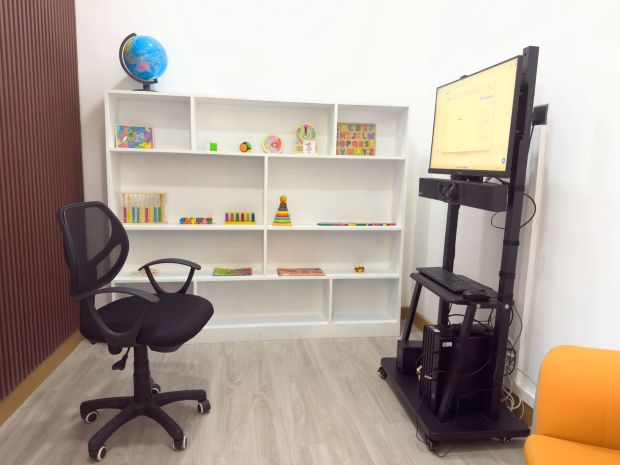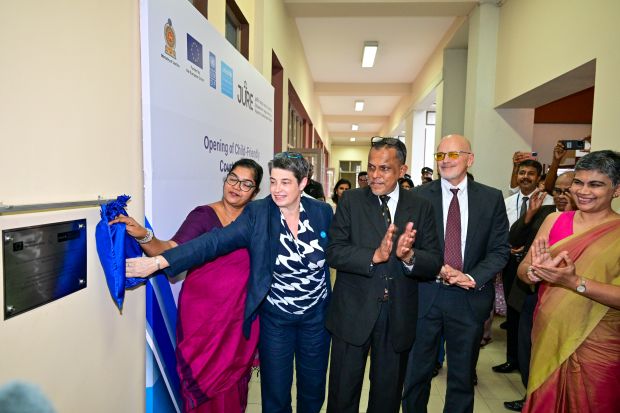Sri Lanka launches revolutionary child-friendly justice system to support violence victims
Kandy High Court becomes first in the country to feature child witness protection technology as part of EU-funded initiative
KANDY – Sri Lanka unveiled a groundbreaking child protection initiative on Wednesday (17) that promises to transform how the justice system handles cases involving child victims of violence, introducing digital innovations and streamlined services from initial reporting through long-term care.
The model service, launched simultaneously by the Ministry of Justice and National Integration and the Ministry of Women and Child Affairs, represents the country’s most comprehensive reform of child protection mechanisms in decades. Funded by the European Union through UNICEF’s Support to Justice Sector Project (JURE), the initiative aims to create a seamless support system for children who have experienced violence.
At the heart of the reform lies a technological breakthrough at Kandy High Court, where newly installed audio-visual equipment now allows child witnesses to testify from a separate, age-appropriate room within the court premises. This innovation, which operationalizes amendments to the Code of Criminal Procedure passed in June 2025, eliminates the trauma of direct confrontation between child victims and their alleged perpetrators.

“This is a turning point for Sri Lanka’s justice system,” said Justice and National Integration Minister Harshana Nanayakkara during Wednesday’s launch ceremony. “These services will ensure that children will have a voice in court without fear, protected by law, supported by technology, and treated with dignity.”
The child-friendly court facilities have been completely refurbished with modern technology and age-appropriate design elements, marking the first step toward what Nanayakkara described as “specializing high courts for children”.
The model service encompasses six flagship initiatives designed to create what officials call a “continuum of care” for child victims. These include upgrading the 1929 national helpline with improved response capabilities; coordinated approach across multiple agencies; expanded counselling and rehabilitation programs; streamlined justice processes, reducing delays and improving efficiency in court proceedings; new protocols for gathering testimony from children and child-friendly courts with physical and procedural changes to create safer environments.
Women and Children’s Affairs Minister Saroja Paulraj emphasized the coordinated approach: “By taking a multi-sectoral approach, we aim to ensure that children receive quality justice and at the same time are able to access protection and welfare services – all delivered in a child-sensitive manner.”
The launch fulfils commitments Sri Lanka made at the 2024 Bogotá Conference on Ending Violence Against Children and aligns with the National Policy Framework’s child protection goals.
EU Ambassador to Sri Lanka Carmen Moreno highlighted the urgency behind the initiative: “Violence against children remains a serious concern and demands immediate action. The European Union and UNICEF partnership, through the JURE project, has been instrumental in translating the Government of Sri Lanka’s commitment to end violence against children into actions.”
UNICEF Representative Emma Brigham described the launch as transformational: “Today, Sri Lanka is turning its global commitments into tangible change for children. A holistic, coordinated, and child-centred system ensures that children are safeguarded and supported to restore their lives.”
While Kandy serves as the pilot location, officials indicated plans for nationwide expansion of the model service, though specific timelines were not announced. The initiative is guided by international best practices and designed to address long-standing concerns about the efficiency and quality of services for children in Sri Lanka’s justice system.
The program represents a significant shift from traditional approaches that often re-traumatized child victims through lengthy, insensitive legal processes. Instead, the new model prioritizes children’s rights, dignity, and wellbeing while maintaining the integrity of judicial proceedings.
Sri Lanka has faced ongoing challenges in addressing violence against children, with critics pointing to systemic delays, inadequate support services, and court procedures that often traumatized young victims. The new model service aims to address these issues through technological solutions, procedural reforms, and enhanced inter-agency coordination.
JURE, supported by the European Union, is jointly implemented by UNICEF and UNDP and facilitated by the Ministry of Justice. It aims to strengthen the justice system to be more accessible, efficient, and inclusive. UNICEF leads efforts to enhance child-friendly justice and child protection processes, ensuring better protection and support for children within the legal system.
-ENCL



Comments are closed, but trackbacks and pingbacks are open.